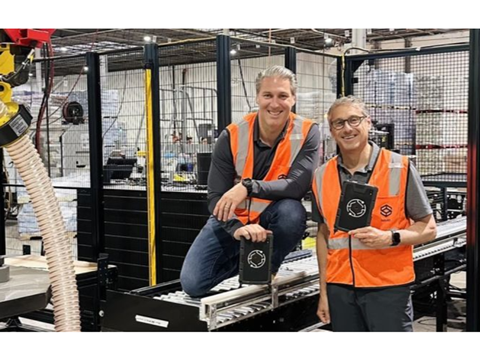
Sojo Industries has received $40 million in funding from S2G Investments to help deploy its mobile packaging lines, improve its track-and-trace platform, and automate its combination of robotic hardware and blockchain-based software.
Among Sojo’s solutions is the patented Sojo Flight system, through which customers – alongside Sojo’s own production and assembly facilities – are set to achieve rapid variety-pack production on-site via mobile manufacturing lines. Apparently, these modular and robotic solutions can be deployed and fully operational in one hour.
Sojo flight is set to cut down on the complicated logistics and costs of transporting products to separate co-packing locations, instead saving customers money on freight and packaging expenses.
Furthermore, Sojo Shield is a vertically integrated track-and-trace software platform designed to keep the whole supply chain up-to-date with real-time geolocation, analytics, and operational insights – thus helping to manage inventory, product quality, and logistics mapping capabilities.
This solution has reportedly helped customers save over five million freight miles, in turn saving emissions and reducing inefficiency across value chains.
The funding is also set to benefit Sojo’s ‘Atoms to Bits’ platform, which brings together state-of-the-art robotic hardware and a blockchain-based software platform to create a ‘full suite of capabilities’ for large-scale customers.
With these solutions, Sojo aims to boost the speed, flexibility, and flexibility of its customers’ supply chains; the company claims its hardware has been adopted by Fortune 500 companies, emerging brands, co-manufacturers, and distributors across the food, beverage, e-commerce, and CPG sectors.
“Sojo is addressing a core pain point in the food and beverage supply chain by tackling the fragmented, manual repackaging and distribution processes that lead to hidden costs and operational drag,” said Matthew Walker, managing director of S2G’s food & agriculture strategy. “As complexity grows, brands need more agility, and traditional workflows that have multiple handoffs and limited ability to adapt to dynamic market demands are no longer sustainable.”
“This investment marks a pivotal moment in our journey,” continued Barak Bar-Cohen, founder and CEO of Sojo. “As consumer demand for variety and customization accelerates, brands are increasingly challenged by legacy packaging models that are slow, inflexible, and costly.
“S2G has deep experience in sustainable supply chain investments and with their partnership, we are committed to delivering alternative technology solutions that reduce freight, labour, and emissions, while helping brands drive profitable innovation and get on shelf faster.”
“Sojo is a company focused on delivering solutions at the seams of the food, energy, and logistics sectors, a nexus that is a core focus of S2G’s strategy,” added Francis O’Sullivan, managing director of S2G’s energy strategy. “We believe Barak and his team have that rare combination of deep technical capability and operational efficiency needed to deliver disruptive innovation in packaging solutions, and we’re proud to support their growth.”
Earlier this year, Glacier, a producer of AI robots that improve recovery and purity rates in the recycling process, raised $16 million in a recent Series A funding round led by Ecosystem Integrity Fund. EIF partner Sasha Brown described how the purpose-built AI can “deploy quickly without disrupting existing operations”.
In another partnership, Packsize has joined forces with Sitma and Paccurate to implement automated bagging systems and right-sizing software into its global operations; in doing so, it hopes to become a ‘one-stop shop’ for every requirement with a complete packaging portfolio.
If you liked this story, you might also enjoy:
The ultimate guide to the Packaging and Packaging Waste Regulation in 2025
How are the top brands progressing on packaging sustainability?
Everything you need to know about global packaging sustainability regulation in 2025
The key to increasing the use of reusable packaging in supermarkets














No comments yet